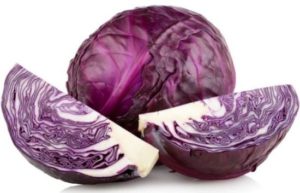Contents
Uses
Red cabbage is often used raw for salads and coleslaw. This vegetable can be eaten cooked. It is the traditional accompanying side dish paired with many German meals—most notably, Sauerbraten. At Christmas it can be spiced and served as an accompaniment to seasonal roast goose.
Benefits
Cancer Prevention: One of the most important functions of red cabbage is its role in cancer prevention. The high levels of antioxidant components in red cabbage make it extremely important as a preventative measure. Antioxidants are substances that can neutralize free radicals, which are the harmful byproducts of cellular metabolism. These free radicals are responsible for various serious diseases, including cancer and heart disease. Red cabbage is rich in antioxidants, including anthocyanins and indoles. This is actually where the purple color comes from, as some of these phytochemicals normally show in this hue. The rich coloring is proof of just how powerful these vegetables are for your overall health. The indoles in red cabbage have been connected to reducing breast cancer in women in a number of studies. Vitamin A has also been connected with reducing the chances of lung cancer.
Weight Loss Aid: Since red cabbage is very low in calories, but high in dietary fiber and has a wealth of important vitamins and minerals. Basically, this means that it gives you more “bang for your buck”, leaving you feeling full and taking care of your nutritional needs, without encouraging you to eat more food or overeat from empty calories. This can be a great addition to your daily diet if you are trying to lose weight, maintain a diet regimen, or simply improve your intake of calories.
Premature Aging: There are a number of aspects in red cabbage that makes it ideal for keeping you looking young. Antioxidants do more than protect you from the impact of free radicals in terms of critical disease; they also help to reduce the signs of aging that can occur due to free radicals. Antioxidants keep your skin fresh, tight, and flexible, reducing the wrinkles and age spots that so commonly occur. Furthermore, the high levels of vitamin A in red cabbage is very beneficial for skin health, regrowth of skin cells, protection from sun damage, and the elasticity of the skin.
Eye Health: The high levels of vitamin A are not only good for your skin, but also for your eyes. Vitamin A helps to keep eyesight healthy, and prevents macular degeneration and cataract formation. Vitamin A can also be converted into beta carotene, which is very important for maintaining eye health as you age.
Ulcers: Red cabbage contains a large amount of a specific amino acid called glutamine. This specific amino acid is very good for reducing the inflammation and pain associated with ulcers in the gastrointestinal system. Red cabbage juice is specifically the best treatment for this condition and has been used as a home remedy for a very long time.
Immune System Booster: Red cabbage is a wealth of vitamins, but none is as important as vitamin C. Ascorbic acid is an important antioxidant and is a massive element of our immune system. It stimulates the activity of white blood cells, which form the first line of defense for the immune system. Furthermore, vitamin C is important in the formation of collagen, which keeps our bodies and cells connected and solid.
Alzheimer’s Disease:
One of the most tragic diseases that often strikes as we get older is Alzheimer’s disease. People have been trying to find preventative measures or cures for this disease for many years, and fortunately, red cabbage has been found to be very potent in protecting the cognitive activity of people. The formation of a certain type of plaque is actually what causes a great deal of the memory and cognitive loss in those patients. The anthocyanins in red cabbage specifically reduce the occurrence of this plaque, protecting your brain against this horrible disease.
Cautions
There are no known dangers, however, if you suffer from hypo-thyroidism, it is recommended that you stay away from red cabbage. Also, for pregnant mothers, babies often develop colic if their mothers have eaten cabbage, so most doctors recommend not consuming red cabbage while pregnant. Other than that, enjoy all the cabbage you want!
Interactions
None are recorded. Please consult with a specialist.
Other names
purple cabbage, red kraut, or blue kraut
References
Source: Wikipedia, https://en.wikipedia.org/wiki/Red_cabbage
OrganicFacts, https://www.organicfacts.net/health-benefits/vegetable/red-cabbage.html

